×
Il semble que vous utilisiez une version obsolète de internet explorer. Internet explorer n'est plus supporté par Microsoft depuis fin 2015. Nous vous invitons à utiliser un navigateur plus récent tel que Firefox, Google Chrome ou Microsoft Edge.
My Player placeholder

Devenez membre d'Incathlab et bénéficiez d'un accès complet !
Vous devez être membre pour accéder aux vidéos Incathlab sans limitation. Inscrivez vous gratuitement en moins d'une minute et accédez à tous les services Incathlab ! Vous avez aussi la possibilité de vous connecter directement avec votre compte facebook ou twitter en cliquant sur login en haut à droite du site.
Inscription Connexion
Inscription Connexion
17587 vues
Please give us your feedback after the live
Fill the survey →
An elderly patient at high bleeding risk and ASA allergy with previous PCI will be undergoing PCI live from Tzanck Institute, Saint-Laurent du Var (France) by Dr Alexandre Avran and Dr Georgios Sideris.
Around this live case & interactive discussion with the audience, both experts will perform this case in a step-by-step approach, observing the chosen strategy depending on patient data and indications, analysing the devices selection, commenting the management of complications, and concluding with the quality of results.
Program
| 14:00 |
Introduction & Presentation of the Case |
| 14:10 |
Live case: Challenges of PCI and DAPT in an elderly patient with ASA allergy Dr Avran & Dr Sideris |
| 15:20 |
Take home messages |
Clinical Data
- Female, 82 years old
- Angor crescendo
-
Risk Factors:
- Non-insulin dependent diabetes (NIDDM)
- Dyslipidemia
- Allergy to aspirin (quincke edema)
- Plavix treatment
- Previous LAD and Cx stenting with Synergy stents
- The patient needs a short dual antiaggregant therapy
Educational objectives
-
Discuss challenges of PCI in high bleeding risk elderly.
-
How new studies such as SENIOR can impact our choice of stents.
-
ASA allergy and how to deal with it post PCI.
-
Role of intravascular imaging in PCI and short DAPT.
Audience
- This web symposium is dedicated to interventional cardiologists interested and/or specialized in coronary angioplasty.
- A prerequisite for attendees in an initial knowledge and practice of angioplasty.
This session is produced and broadcasted with sonar system by incathlab

Date du tournage : 06/02/2018
Dernière mise à jour : 03/08/2018
Dernière mise à jour : 03/08/2018
Participer à la discussion
Suggestions
Mercredi 22 mai 2024 de 15h à 16h (GMT+2)
Honolulu : Mercredi 22 mai 2024 de 04h à 05h (GMT+2)
San Francisco : Mercredi 22 mai 2024 de 07h à 08h (GMT+2)
New York : Mercredi 22 mai 2024 de 10h à 11h (GMT+2)
Buenos Aires : Mercredi 22 mai 2024 de 11h à 12h (GMT+2)
Reykjavik : Mercredi 22 mai 2024 de 14h à 15h (GMT+2)
London / Dublin : Mercredi 22 mai 2024 de 15h à 16h (GMT+2)
Paris / Berlin : Mercredi 22 mai 2024 de 16h à 17h (GMT+2)
Istanbul : Mercredi 22 mai 2024 de 17h à 18h (GMT+2)
Moscou / Dubaï : Mercredi 22 mai 2024 de 18h à 19h (GMT+2)
Bangkok : Mercredi 22 mai 2024 de 21h à 22h (GMT+2)
Shanghai : Mercredi 22 mai 2024 de 22h à 23h (GMT+2)
Tokyo : Mercredi 22 mai 2024 de 23h à 00h (GMT+2)
Sydney : Jeudi 23 mai 2024 de 01h à 02h (GMT+2)
Wellington : Jeudi 23 mai 2024 de 03h à 04h (GMT+2)
San Francisco : Mercredi 22 mai 2024 de 07h à 08h (GMT+2)
New York : Mercredi 22 mai 2024 de 10h à 11h (GMT+2)
Buenos Aires : Mercredi 22 mai 2024 de 11h à 12h (GMT+2)
Reykjavik : Mercredi 22 mai 2024 de 14h à 15h (GMT+2)
London / Dublin : Mercredi 22 mai 2024 de 15h à 16h (GMT+2)
Paris / Berlin : Mercredi 22 mai 2024 de 16h à 17h (GMT+2)
Istanbul : Mercredi 22 mai 2024 de 17h à 18h (GMT+2)
Moscou / Dubaï : Mercredi 22 mai 2024 de 18h à 19h (GMT+2)
Bangkok : Mercredi 22 mai 2024 de 21h à 22h (GMT+2)
Shanghai : Mercredi 22 mai 2024 de 22h à 23h (GMT+2)
Tokyo : Mercredi 22 mai 2024 de 23h à 00h (GMT+2)
Sydney : Jeudi 23 mai 2024 de 01h à 02h (GMT+2)
Wellington : Jeudi 23 mai 2024 de 03h à 04h (GMT+2)
DanGER shock trial results and the significance to reduce adverse events
Partager
Mercredi 30 mars 2022 de 18h à 19h (GMT+2)
Honolulu : Mercredi 30 mars 2022 de 07h à 08h (GMT+2)
San Francisco : Mercredi 30 mars 2022 de 10h à 11h (GMT+2)
New York : Mercredi 30 mars 2022 de 13h à 14h (GMT+2)
Buenos Aires : Mercredi 30 mars 2022 de 14h à 15h (GMT+2)
Reykjavik : Mercredi 30 mars 2022 de 17h à 18h (GMT+2)
London / Dublin : Mercredi 30 mars 2022 de 18h à 19h (GMT+2)
Paris / Berlin : Mercredi 30 mars 2022 de 19h à 20h (GMT+2)
Istanbul : Mercredi 30 mars 2022 de 20h à 21h (GMT+2)
Moscou / Dubaï : Mercredi 30 mars 2022 de 21h à 22h (GMT+2)
Bangkok : Jeudi 31 mars 2022 de 00h à 01h (GMT+2)
Shanghai : Jeudi 31 mars 2022 de 01h à 02h (GMT+2)
Tokyo : Jeudi 31 mars 2022 de 02h à 03h (GMT+2)
Sydney : Jeudi 31 mars 2022 de 04h à 05h (GMT+2)
Wellington : Jeudi 31 mars 2022 de 06h à 07h (GMT+2)
San Francisco : Mercredi 30 mars 2022 de 10h à 11h (GMT+2)
New York : Mercredi 30 mars 2022 de 13h à 14h (GMT+2)
Buenos Aires : Mercredi 30 mars 2022 de 14h à 15h (GMT+2)
Reykjavik : Mercredi 30 mars 2022 de 17h à 18h (GMT+2)
London / Dublin : Mercredi 30 mars 2022 de 18h à 19h (GMT+2)
Paris / Berlin : Mercredi 30 mars 2022 de 19h à 20h (GMT+2)
Istanbul : Mercredi 30 mars 2022 de 20h à 21h (GMT+2)
Moscou / Dubaï : Mercredi 30 mars 2022 de 21h à 22h (GMT+2)
Bangkok : Jeudi 31 mars 2022 de 00h à 01h (GMT+2)
Shanghai : Jeudi 31 mars 2022 de 01h à 02h (GMT+2)
Tokyo : Jeudi 31 mars 2022 de 02h à 03h (GMT+2)
Sydney : Jeudi 31 mars 2022 de 04h à 05h (GMT+2)
Wellington : Jeudi 31 mars 2022 de 06h à 07h (GMT+2)
DAPT meets its MASTER webinar
Part 2: When DAPT meets OAC - what to do?
Partager
Mardi 4 octobre 2022 de 17h à 18h15 (GMT+2)
Honolulu : Mardi 4 octobre 2022 de 06h à 07h15 (GMT+2)
San Francisco : Mardi 4 octobre 2022 de 09h à 10h15 (GMT+2)
New York : Mardi 4 octobre 2022 de 12h à 13h15 (GMT+2)
Buenos Aires : Mardi 4 octobre 2022 de 13h à 14h15 (GMT+2)
Reykjavik : Mardi 4 octobre 2022 de 16h à 17h15 (GMT+2)
London / Dublin : Mardi 4 octobre 2022 de 17h à 18h15 (GMT+2)
Paris / Berlin : Mardi 4 octobre 2022 de 18h à 19h15 (GMT+2)
Istanbul : Mardi 4 octobre 2022 de 19h à 20h15 (GMT+2)
Moscou / Dubaï : Mardi 4 octobre 2022 de 20h à 21h15 (GMT+2)
Bangkok : Mardi 4 octobre 2022 de 23h à 00h15 (GMT+2)
Shanghai : Mercredi 5 octobre 2022 de 00h à 01h15 (GMT+2)
Tokyo : Mercredi 5 octobre 2022 de 01h à 02h15 (GMT+2)
Sydney : Mercredi 5 octobre 2022 de 03h à 04h15 (GMT+2)
Wellington : Mercredi 5 octobre 2022 de 05h à 06h15 (GMT+2)
San Francisco : Mardi 4 octobre 2022 de 09h à 10h15 (GMT+2)
New York : Mardi 4 octobre 2022 de 12h à 13h15 (GMT+2)
Buenos Aires : Mardi 4 octobre 2022 de 13h à 14h15 (GMT+2)
Reykjavik : Mardi 4 octobre 2022 de 16h à 17h15 (GMT+2)
London / Dublin : Mardi 4 octobre 2022 de 17h à 18h15 (GMT+2)
Paris / Berlin : Mardi 4 octobre 2022 de 18h à 19h15 (GMT+2)
Istanbul : Mardi 4 octobre 2022 de 19h à 20h15 (GMT+2)
Moscou / Dubaï : Mardi 4 octobre 2022 de 20h à 21h15 (GMT+2)
Bangkok : Mardi 4 octobre 2022 de 23h à 00h15 (GMT+2)
Shanghai : Mercredi 5 octobre 2022 de 00h à 01h15 (GMT+2)
Tokyo : Mercredi 5 octobre 2022 de 01h à 02h15 (GMT+2)
Sydney : Mercredi 5 octobre 2022 de 03h à 04h15 (GMT+2)
Wellington : Mercredi 5 octobre 2022 de 05h à 06h15 (GMT+2)
Quand le patient et l’angiographie racontent des histoires différentes
Pourquoi le diagnostic des anomalies ou dysfonctions microcirculatoires est important
Partager
Mardi 25 octobre 2022 de 18h à 19h15 (GMT+2)
Honolulu : Mardi 25 octobre 2022 de 07h à 08h15 (GMT+2)
San Francisco : Mardi 25 octobre 2022 de 10h à 11h15 (GMT+2)
New York : Mardi 25 octobre 2022 de 13h à 14h15 (GMT+2)
Buenos Aires : Mardi 25 octobre 2022 de 14h à 15h15 (GMT+2)
Reykjavik : Mardi 25 octobre 2022 de 17h à 18h15 (GMT+2)
London / Dublin : Mardi 25 octobre 2022 de 18h à 19h15 (GMT+2)
Paris / Berlin : Mardi 25 octobre 2022 de 19h à 20h15 (GMT+2)
Istanbul : Mardi 25 octobre 2022 de 20h à 21h15 (GMT+2)
Moscou / Dubaï : Mardi 25 octobre 2022 de 21h à 22h15 (GMT+2)
Bangkok : Mercredi 26 octobre 2022 de 00h à 01h15 (GMT+2)
Shanghai : Mercredi 26 octobre 2022 de 01h à 02h15 (GMT+2)
Tokyo : Mercredi 26 octobre 2022 de 02h à 03h15 (GMT+2)
Sydney : Mercredi 26 octobre 2022 de 04h à 05h15 (GMT+2)
Wellington : Mercredi 26 octobre 2022 de 06h à 07h15 (GMT+2)
San Francisco : Mardi 25 octobre 2022 de 10h à 11h15 (GMT+2)
New York : Mardi 25 octobre 2022 de 13h à 14h15 (GMT+2)
Buenos Aires : Mardi 25 octobre 2022 de 14h à 15h15 (GMT+2)
Reykjavik : Mardi 25 octobre 2022 de 17h à 18h15 (GMT+2)
London / Dublin : Mardi 25 octobre 2022 de 18h à 19h15 (GMT+2)
Paris / Berlin : Mardi 25 octobre 2022 de 19h à 20h15 (GMT+2)
Istanbul : Mardi 25 octobre 2022 de 20h à 21h15 (GMT+2)
Moscou / Dubaï : Mardi 25 octobre 2022 de 21h à 22h15 (GMT+2)
Bangkok : Mercredi 26 octobre 2022 de 00h à 01h15 (GMT+2)
Shanghai : Mercredi 26 octobre 2022 de 01h à 02h15 (GMT+2)
Tokyo : Mercredi 26 octobre 2022 de 02h à 03h15 (GMT+2)
Sydney : Mercredi 26 octobre 2022 de 04h à 05h15 (GMT+2)
Wellington : Mercredi 26 octobre 2022 de 06h à 07h15 (GMT+2)
The role of hemodynamic support in cardiogenic shock:
When to escalate and when to de-escalate
Partager
Lundi 30 octobre 2023 de 17h à 18h (GMT+1)
Honolulu : Lundi 30 octobre 2023 de 06h à 07h (GMT+1)
San Francisco : Lundi 30 octobre 2023 de 08h à 09h (GMT+1)
New York : Lundi 30 octobre 2023 de 11h à 12h (GMT+1)
Buenos Aires : Lundi 30 octobre 2023 de 13h à 14h (GMT+1)
London / Dublin : Lundi 30 octobre 2023 de 16h à 17h (GMT+1)
Paris / Berlin : Lundi 30 octobre 2023 de 17h à 18h (GMT+1)
Istanbul : Lundi 30 octobre 2023 de 18h à 19h (GMT+1)
Moscou / Dubaï : Lundi 30 octobre 2023 de 20h à 21h (GMT+1)
Bangkok : Lundi 30 octobre 2023 de 23h à 00h (GMT+1)
Shanghai : Mardi 31 octobre 2023 de 00h à 01h (GMT+1)
Tokyo : Mardi 31 octobre 2023 de 01h à 02h (GMT+1)
Sydney : Mardi 31 octobre 2023 de 02h à 03h (GMT+1)
Wellington : Mardi 31 octobre 2023 de 04h à 05h (GMT+1)
San Francisco : Lundi 30 octobre 2023 de 08h à 09h (GMT+1)
New York : Lundi 30 octobre 2023 de 11h à 12h (GMT+1)
Buenos Aires : Lundi 30 octobre 2023 de 13h à 14h (GMT+1)
London / Dublin : Lundi 30 octobre 2023 de 16h à 17h (GMT+1)
Paris / Berlin : Lundi 30 octobre 2023 de 17h à 18h (GMT+1)
Istanbul : Lundi 30 octobre 2023 de 18h à 19h (GMT+1)
Moscou / Dubaï : Lundi 30 octobre 2023 de 20h à 21h (GMT+1)
Bangkok : Lundi 30 octobre 2023 de 23h à 00h (GMT+1)
Shanghai : Mardi 31 octobre 2023 de 00h à 01h (GMT+1)
Tokyo : Mardi 31 octobre 2023 de 01h à 02h (GMT+1)
Sydney : Mardi 31 octobre 2023 de 02h à 03h (GMT+1)
Wellington : Mardi 31 octobre 2023 de 04h à 05h (GMT+1)
How do the new antithrombotic recommendations affect your HBR patients?
Gain insights from a patient case analysis
Partager
With Thomas Hovasse
Long RCA occlusion: antegrade or retrograde approach?
Alex & Friends - Ep.3
Partager
Mercredi 21 juin 2023 de 16h à 17h30 (GMT+2)
Honolulu : Mercredi 21 juin 2023 de 05h à 06h30 (GMT+2)
San Francisco : Mercredi 21 juin 2023 de 08h à 09h30 (GMT+2)
New York : Mercredi 21 juin 2023 de 11h à 12h30 (GMT+2)
Buenos Aires : Mercredi 21 juin 2023 de 12h à 13h30 (GMT+2)
Reykjavik : Mercredi 21 juin 2023 de 15h à 16h30 (GMT+2)
London / Dublin : Mercredi 21 juin 2023 de 16h à 17h30 (GMT+2)
Paris / Berlin : Mercredi 21 juin 2023 de 17h à 18h30 (GMT+2)
Istanbul : Mercredi 21 juin 2023 de 18h à 19h30 (GMT+2)
Moscou / Dubaï : Mercredi 21 juin 2023 de 19h à 20h30 (GMT+2)
Bangkok : Mercredi 21 juin 2023 de 22h à 23h30 (GMT+2)
Shanghai : Mercredi 21 juin 2023 de 23h à 00h30 (GMT+2)
Tokyo : Jeudi 22 juin 2023 de 00h à 01h30 (GMT+2)
Sydney : Jeudi 22 juin 2023 de 02h à 03h30 (GMT+2)
Wellington : Jeudi 22 juin 2023 de 04h à 05h30 (GMT+2)
San Francisco : Mercredi 21 juin 2023 de 08h à 09h30 (GMT+2)
New York : Mercredi 21 juin 2023 de 11h à 12h30 (GMT+2)
Buenos Aires : Mercredi 21 juin 2023 de 12h à 13h30 (GMT+2)
Reykjavik : Mercredi 21 juin 2023 de 15h à 16h30 (GMT+2)
London / Dublin : Mercredi 21 juin 2023 de 16h à 17h30 (GMT+2)
Paris / Berlin : Mercredi 21 juin 2023 de 17h à 18h30 (GMT+2)
Istanbul : Mercredi 21 juin 2023 de 18h à 19h30 (GMT+2)
Moscou / Dubaï : Mercredi 21 juin 2023 de 19h à 20h30 (GMT+2)
Bangkok : Mercredi 21 juin 2023 de 22h à 23h30 (GMT+2)
Shanghai : Mercredi 21 juin 2023 de 23h à 00h30 (GMT+2)
Tokyo : Jeudi 22 juin 2023 de 00h à 01h30 (GMT+2)
Sydney : Jeudi 22 juin 2023 de 02h à 03h30 (GMT+2)
Wellington : Jeudi 22 juin 2023 de 04h à 05h30 (GMT+2)
Strategies and techniques to treat multivessel disease with complex lesions
Partager
Jeudi 16 décembre 2021 de 17h à 18h (GMT+1)
Honolulu : Jeudi 16 décembre 2021 de 06h à 07h (GMT+1)
San Francisco : Jeudi 16 décembre 2021 de 08h à 09h (GMT+1)
New York : Jeudi 16 décembre 2021 de 11h à 12h (GMT+1)
Buenos Aires : Jeudi 16 décembre 2021 de 13h à 14h (GMT+1)
London / Dublin : Jeudi 16 décembre 2021 de 16h à 17h (GMT+1)
Paris / Berlin : Jeudi 16 décembre 2021 de 17h à 18h (GMT+1)
Istanbul : Jeudi 16 décembre 2021 de 18h à 19h (GMT+1)
Moscou / Dubaï : Jeudi 16 décembre 2021 de 20h à 21h (GMT+1)
Bangkok : Jeudi 16 décembre 2021 de 23h à 00h (GMT+1)
Shanghai : Vendredi 17 décembre 2021 de 00h à 01h (GMT+1)
Tokyo : Vendredi 17 décembre 2021 de 01h à 02h (GMT+1)
Sydney : Vendredi 17 décembre 2021 de 02h à 03h (GMT+1)
Wellington : Vendredi 17 décembre 2021 de 04h à 05h (GMT+1)
San Francisco : Jeudi 16 décembre 2021 de 08h à 09h (GMT+1)
New York : Jeudi 16 décembre 2021 de 11h à 12h (GMT+1)
Buenos Aires : Jeudi 16 décembre 2021 de 13h à 14h (GMT+1)
London / Dublin : Jeudi 16 décembre 2021 de 16h à 17h (GMT+1)
Paris / Berlin : Jeudi 16 décembre 2021 de 17h à 18h (GMT+1)
Istanbul : Jeudi 16 décembre 2021 de 18h à 19h (GMT+1)
Moscou / Dubaï : Jeudi 16 décembre 2021 de 20h à 21h (GMT+1)
Bangkok : Jeudi 16 décembre 2021 de 23h à 00h (GMT+1)
Shanghai : Vendredi 17 décembre 2021 de 00h à 01h (GMT+1)
Tokyo : Vendredi 17 décembre 2021 de 01h à 02h (GMT+1)
Sydney : Vendredi 17 décembre 2021 de 02h à 03h (GMT+1)
Wellington : Vendredi 17 décembre 2021 de 04h à 05h (GMT+1)
The journey from femoral to distal radial
Episode 1 - The Theory
Partager


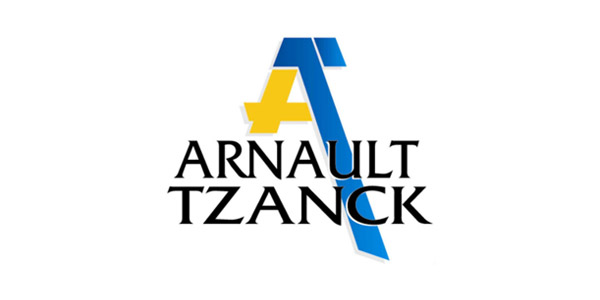

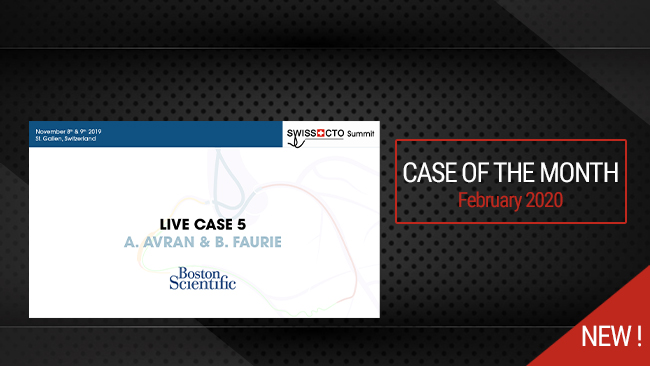
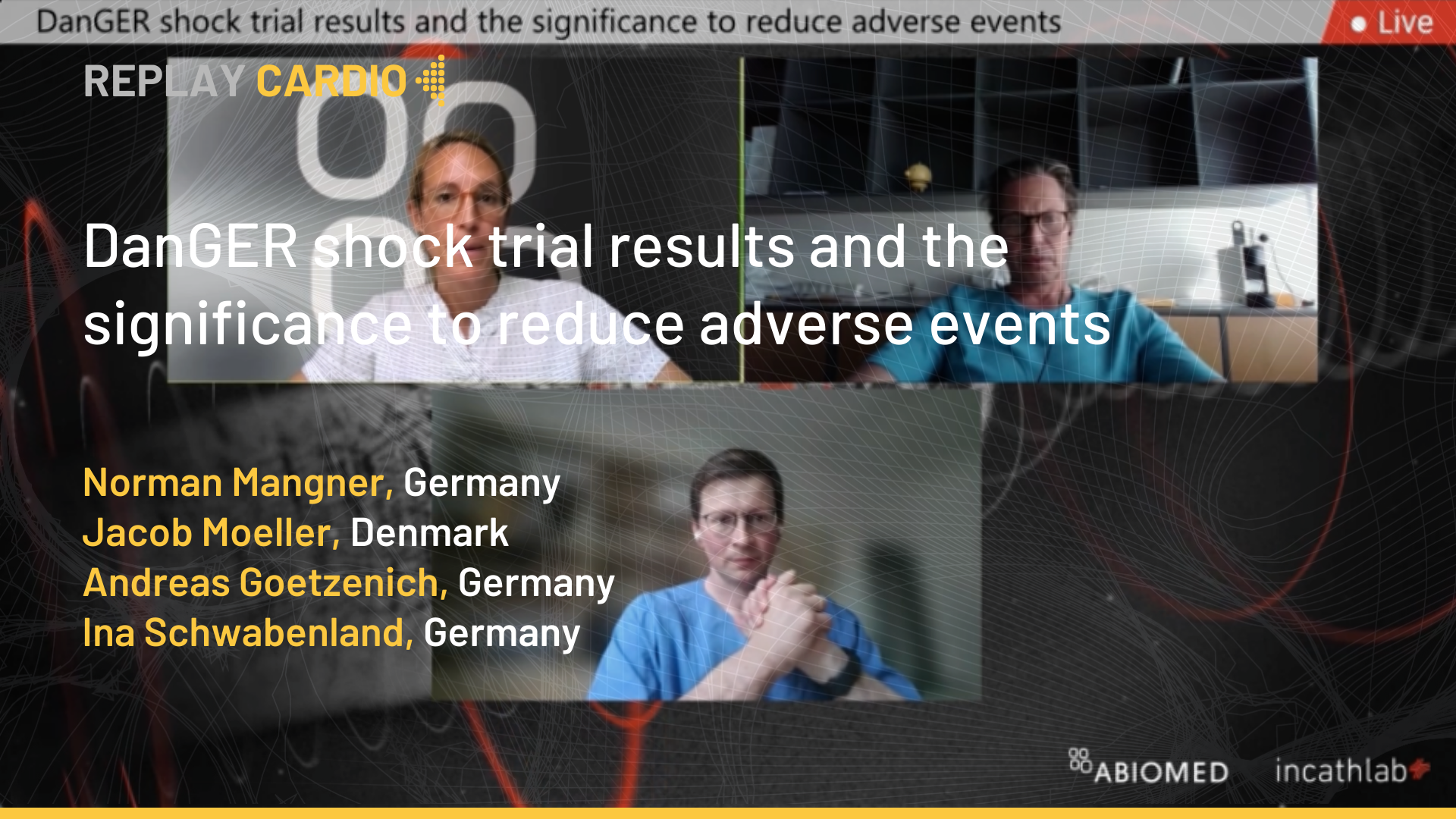
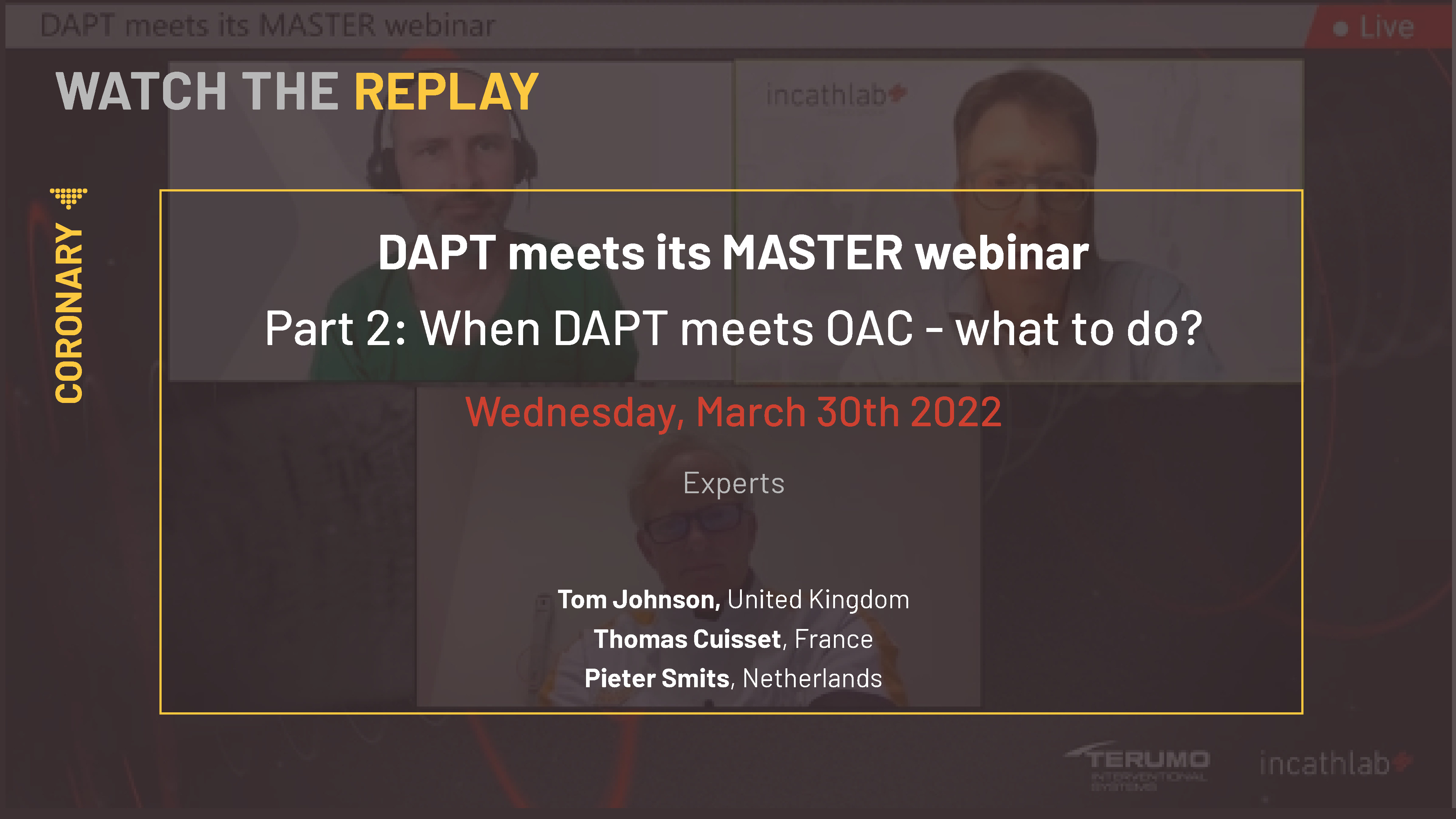

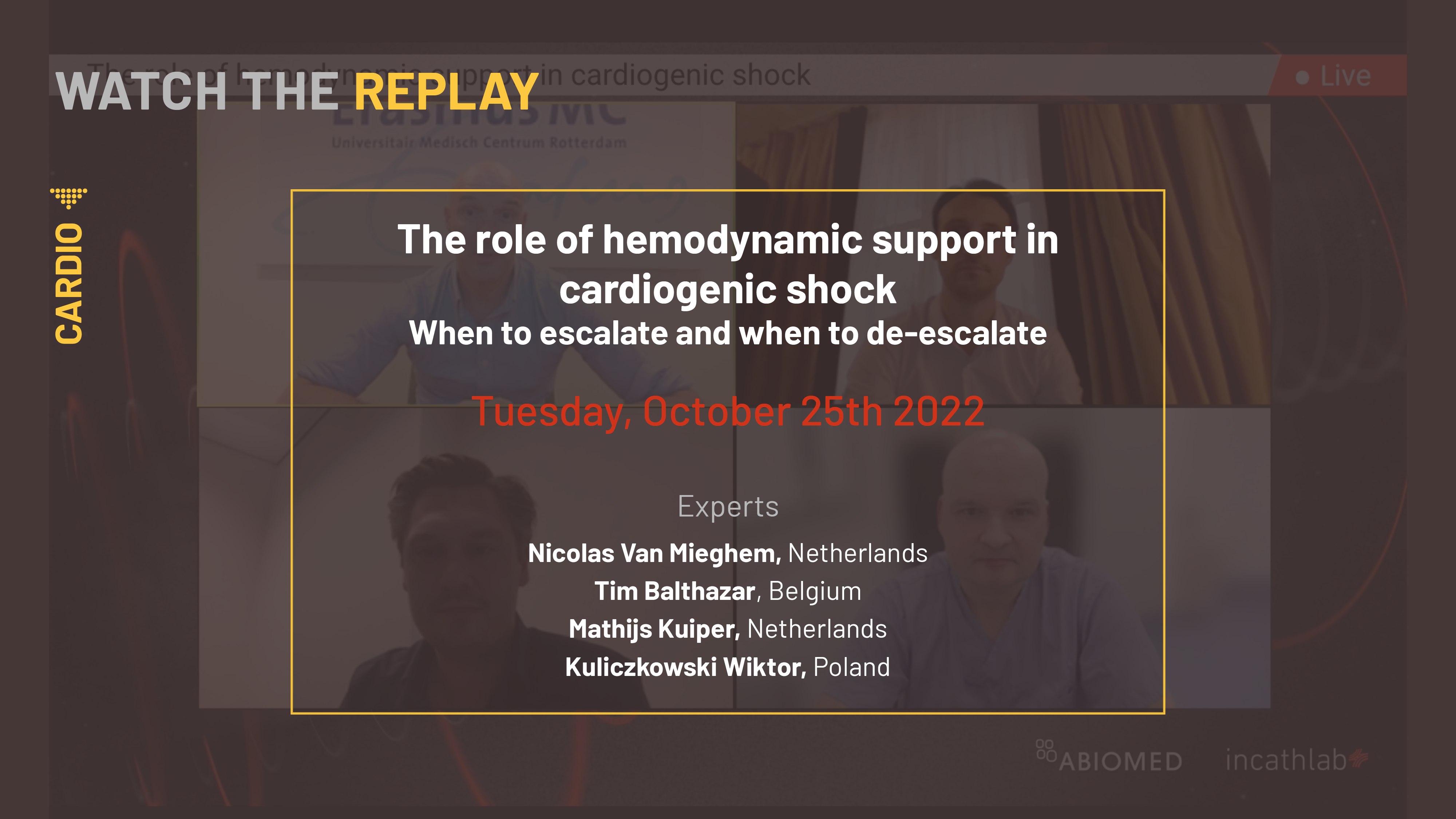

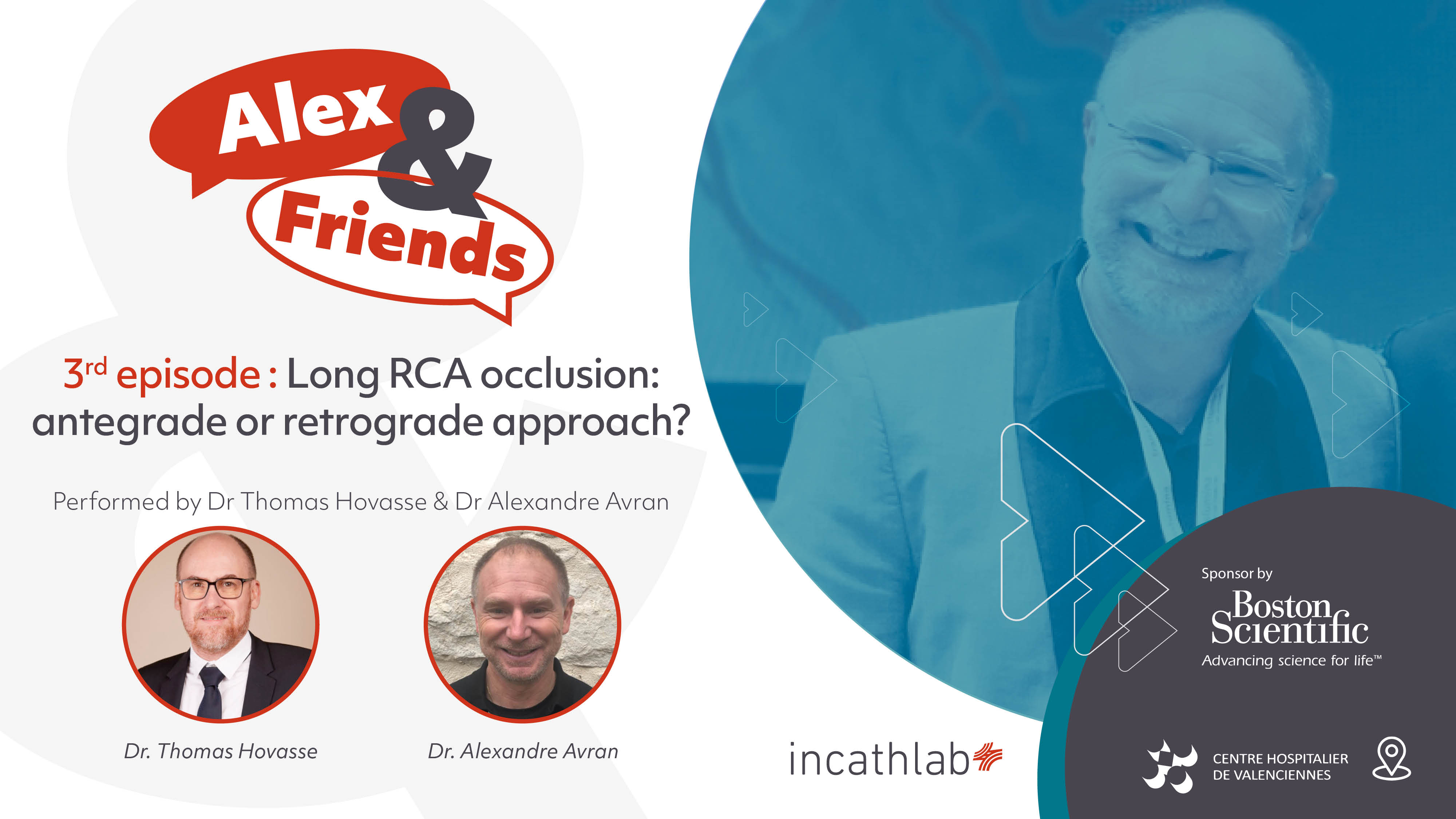
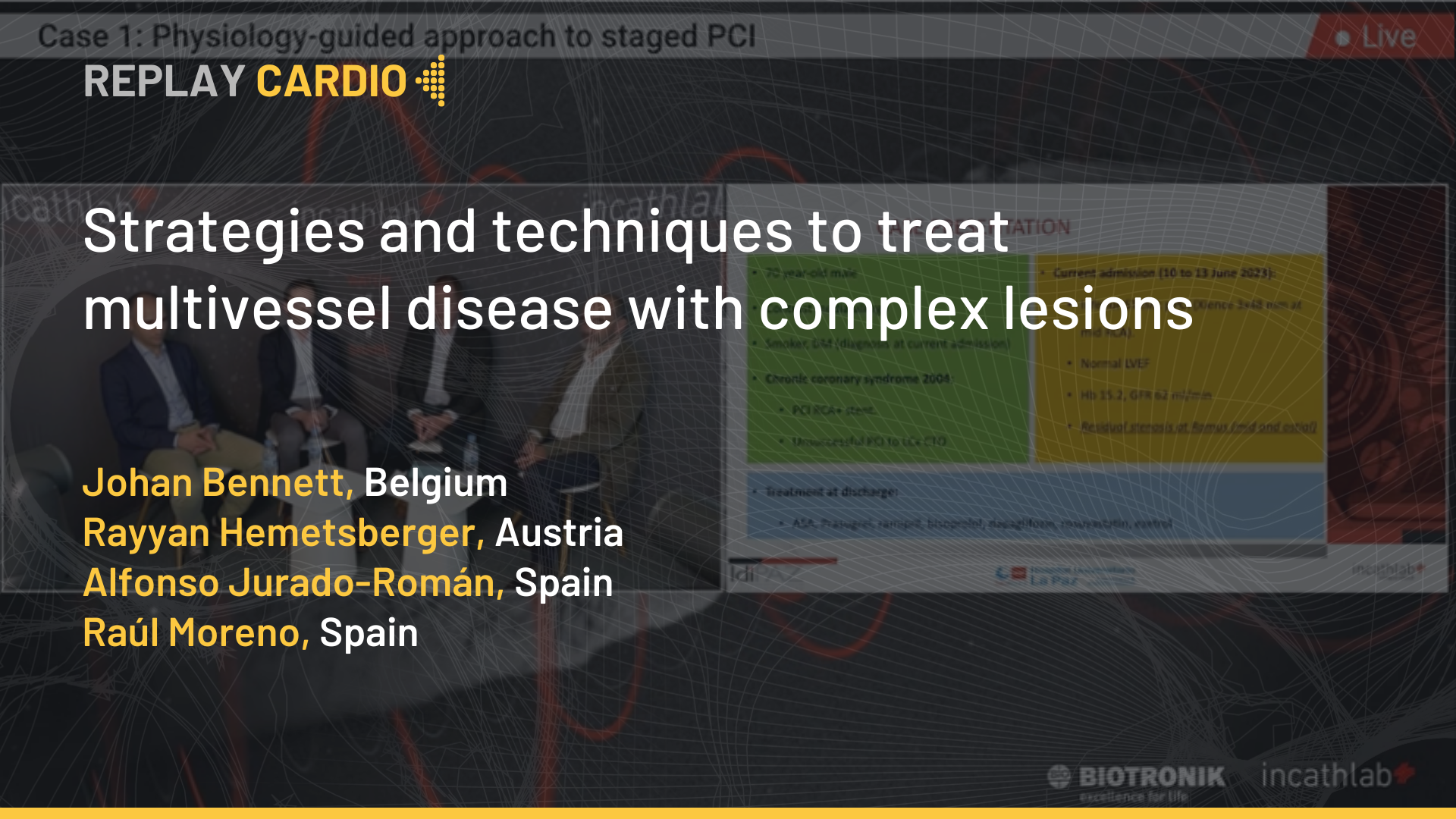
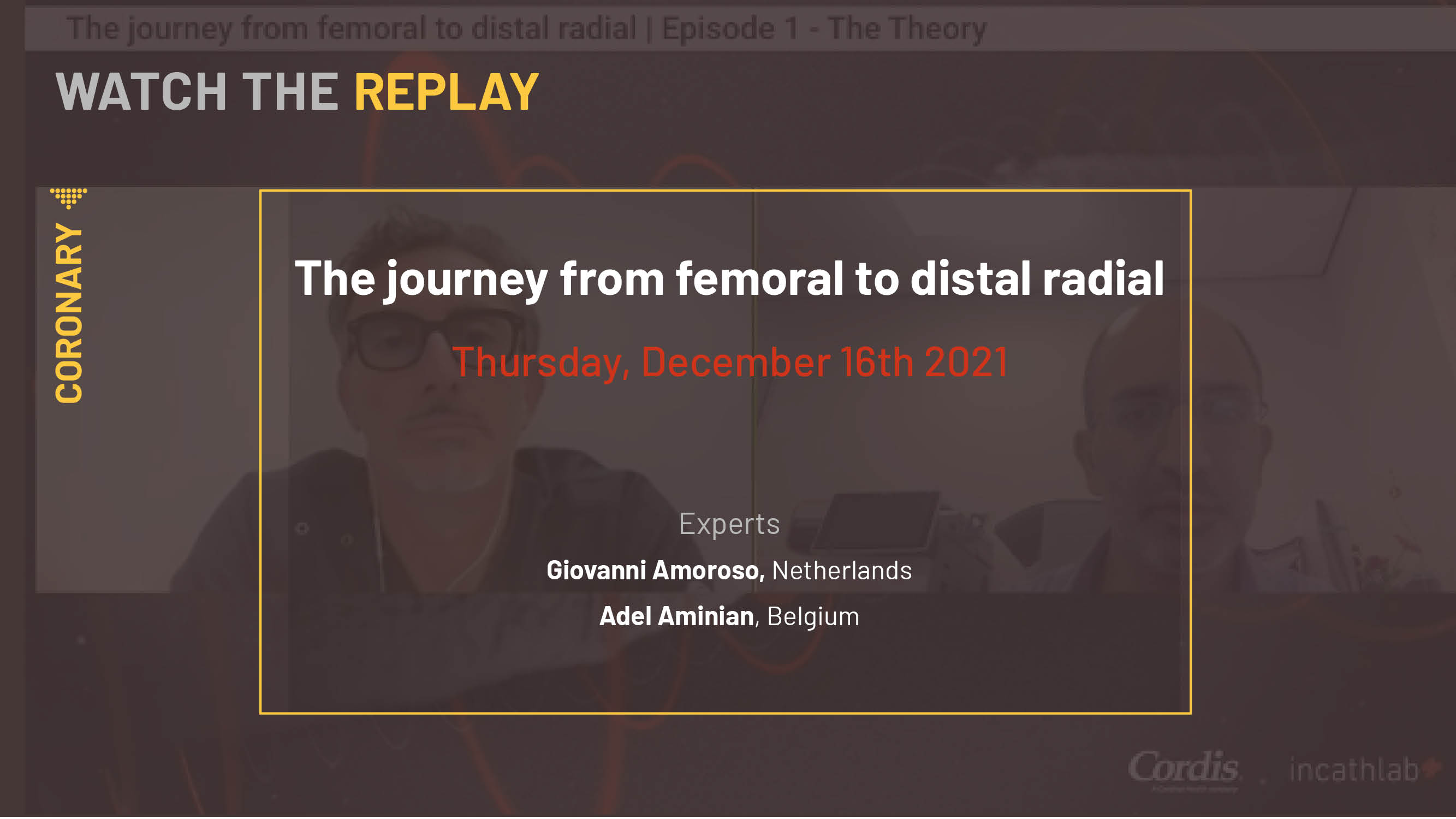
Sajan N. any role for aspirin desensitisation in this case before proceeding to PCI? especially since patient is stable
Veselin B. The diagonals are below 2mm,there should be no plan for bifurcational stenting
Mohamed A. Very interesting discussion and Good results
Ahmed S. Is there any study comparing Synergy vs Bio-freedom stents
Giedre G. What about the Idea to repeat FFR after PCI?